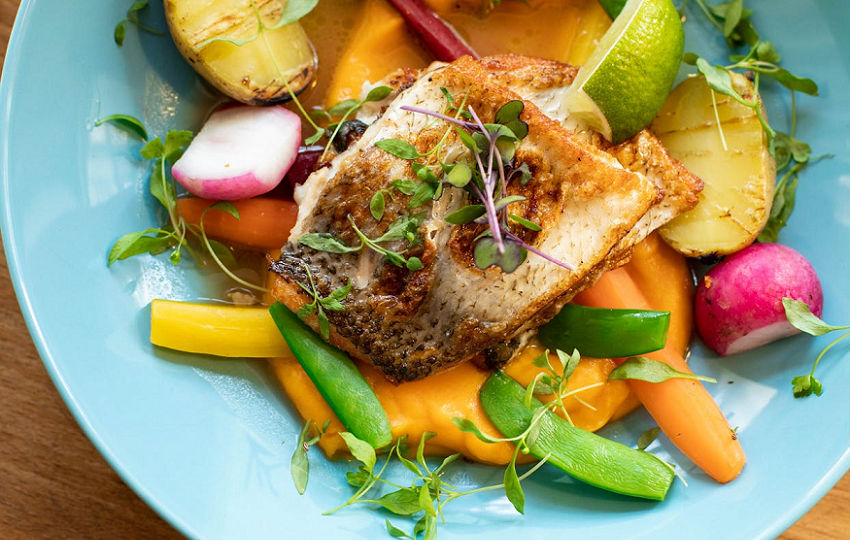As we age, maintaining radiant and healthy skin becomes an increasingly sought-after goal for many people. While various factors influence skin health, nutrition plays a major role in determining the vitality of our skin. In the following, we look at the key nutrients and dietary choices that can contribute to a radiant complexion in aging adults.
Essential Nutrients for Skin Health
The first step in understanding the impact of nutrition on aging skin is recognizing the essential nutrients that promote skin health. Antioxidants, vitamins, minerals, and omega-3 fatty acids are among the critical elements that help maintain the skin’s elasticity, preventing dryness, and protecting against oxidative stress.
Antioxidant-Rich Foods: Nature’s Defense Against Aging
Antioxidants are potent compounds that combat free radicals, which are unstable molecules that contribute to cellular damage and aging.
Including a variety of colorful fruits and vegetables in the diet ensures a diverse range of antioxidants.
Foods such as berries, leafy greens, tomatoes, and citrus fruits are rich sources of vitamins A, C, and E, which act as powerful antioxidants, protecting the skin from the harsh environment and promoting a youthful glow.
Omega-3 Fatty Acids: Nourishing the Skin from Within
Omega-3 fatty acids, primarily found in fatty fish like salmon, mackerel, and flaxseeds, are essential for maintaining skin hydration and flexibility.
These fatty acids support the skin’s lipid barrier, preventing moisture loss and reducing inflammation.
Also, including omega-3-rich foods in the diet not only benefits skin health but also contributes to overall cardiovascular and cognitive well-being in seniors.
Hydration: Water as the Foundation of Skin Wellness
Proper hydration is fundamental for skin health, especially as older adults may experience increased dryness and a decline in skin elasticity.
Drinking an adequate amount of water helps maintain the skin’s moisture balance, reducing the appearance of fine lines and wrinkles.
Herbal teas, fruits with high water content, and water-rich vegetables can also contribute to overall hydration.
Collagen-Boosting Foods: Building Blocks for Skin Structure
Collagen, a structural protein abundant in the skin, provides firmness and elasticity. As we age, collagen production naturally decreases, leading to sagging skin and wrinkles.
Including collagen-boosting foods in the diet can help support the body’s natural collagen production.
Foods like bone broth, chicken, fish, and collagen peptides can provide the necessary amino acids to enhance skin structure and resilience.
Nutrient-Rich Herbs and Spices: Enhancing Flavor and Skin Health
Certain herbs and spices not only add flavor to meals but also offer skin-boosting benefits.
Turmeric, known for its anti-inflammatory properties, can help reduce skin redness and irritation. Garlic and ginger contain antioxidants that contribute to overall skin health.
Including these herbs and spices in regular meals can be a tasty and beneficial way to support senior skin.
The Role of Probiotics in Gut Health and Skin
The gut-skin axis highlights the interconnectedness of digestive health and skin conditions.
Probiotics, found in yogurt, kefir, and fermented foods, promote a healthy gut microbiome.
A balanced gut microbiome can positively impact skin health by reducing inflammation and supporting the body’s ability to absorb essential nutrients.
Moderation and Balance for a Holistic Approach
Focusing on skin-boosting foods is a critical part of holistic nutrition. Older adults should aim for a balanced and varied diet that includes a mix of nutrient-dense foods from different food groups.
As with many things, moderation is key, and avoiding excessive consumption of processed foods, sugars, and unhealthy fats can contribute to overall well-being.
The impact of nutrition on aging skin is profound, and making mindful food choices can significantly contribute to a healthy and radiant complexion.
By incorporating antioxidant-rich fruits and vegetables, omega-3 fatty acids, collagen-boosting foods, and maintaining proper hydration, older adults can nourish their skin from within, supporting a glowing and resilient appearance over the years.




